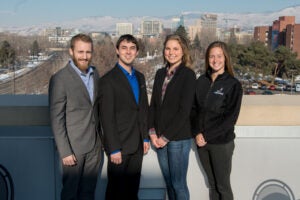

Two teams of Boise State Career Track MBA students receive at large bids to compete in the regional finals for the $1 million Hult Prize in March. More than 50,000 applications were received from over 100 countries. Thanks to the support of the College of Business and Economics and Boise State University at large, the two teams were able to travel to London and Shanghai with their expenses paid.
Read the students’ first-hand accounts of their experience:
The competition provided the team with the opportunity to network and collaborate with students from around the world. The competition started on Friday evening and ran through Saturday night. The Boise State team pitched on Saturday afternoon to a panel of 9 judges from around the world. The panel consisted of executives, entrepreneurs, and lawyers. On Saturday night, the top six teams presented their pitch in front of all the competing teams and judges. The finalists were from Canada, Singapore, Turkey, England, the Philippines, and Egypt. The Canadian team from the University of Waterloo won the Regional final and will be moving on to the Hult Prize accelerator and the chance to pitch for $1M in seed funding at the finals in September. The team developed a mobile application designed to bring together refugees and community members through the exchange of skills, talents, and services.
Overall, the experience was an amazing opportunity to be in a different country working with so many different students around the world trying to solve the refugee crisis. Most importantly, the Boise State team taught the London competitors where Idaho is in the U.S.!
Team members were Ashleigh Anderson, Jessica Bottelberghe, Steven Gabrielsen and Ethan Lopez. Their business idea is an online platform called “A Story to Be Told and their mission is to allow refugees to share their stories in order to connect them with the rest of the world.
Story by Austin Legg.
When we arrived at the Hult International Business School in Shanghai on Friday evening to check-in we were overwhelmed to say the least. Looking around the rooms you couldn’t help but feel like an underdog. There were 42 teams representing countries literally all over the world. We were one of only three teams from the United States. Being from little Boise State University in Boise, Idaho we felt intimidated and inferior. I know for me, I felt like I didn’t belong there. The feeling didn’t go away after the opening ceremonies and following “meet and greet.” I went to bed that night thinking, ‘What have I got us in to?’ The structure of the competition is that there is a morning and an afternoon session. Twenty-one teams in the morning and twenty-one teams in the afternoon. The teams present in three rooms, with seven teams in each room during each session. For the morning session, we sat in a room and watched seven teams present. After the first few presentations, I looked over to Alex Allen and I said, “I don’t want to just do well, I want to win this whole thing.” It was evident that not only did we belong there, but we were well prepared. Boise State and the MBA program had taught me more than I realized. Those feelings of doubt and insecurity left and were quickly replaced with feelings of pride and competitiveness.
In the afternoon we delivered our presentation and we absolutely nailed it! Out of the seven teams in our afternoon room, we were of two teams brought back by the judges for a ten minute round of Q&A, known as a “call back.” This means that it was down to us and the other team for who was going to be advancing from our afternoon pod. We had a good feeling going into the announcement of the final six teams, but unfortunately, they picked the other team from our call back. That team also went on to win the overall Shanghai regional competition later that night. So we can feel good that we at least got beat by the winners. So we know we most likely finished somewhere in the top ten.
Later that night during the final presentations I had a paradigm shift about the competition. It occurred to me that while I would have liked to win, the reality is we weren’t really all competing against each other. We were all on the same team. All of the teams were working towards the common goal of helping restore the basic human rights to refugees. When you step back and realize that no matter who wins, we are going to move closer to that goal, you stop cheering for your team and start cheering for others. Once this change of mindset happened, I really came to develop a great love and respect for everyone there and I was happy with the final results.
It truly was an amazing experience and without a doubt the highlight of not only my experience in graduate school but the undergraduate school as well. We would not have been able to do accomplish what we did without the support of Boise State and Career Track MBA Director Trisha Stevens Lamb. Additionally, it was truly amazing to realize just how well prepared we were by our professors. Boise State offers world-class education and I saw that first-hand. The opportunity to represent the MBA program and Boise State on an international level was an experience I won’t soon forget.
Team members were Alexandria Allen, Becky Davis, Cody Huckvale and Austin Legg. Their business idea aims to restore basic human rights of food, water, shelter, and security by providing income to refugees. Project Recover builds on the skills and talents refugees have to create products that represent their culture. Project Recover provides the work-space, supplies, and materials and buys the product from the maker and sells it via an online store.[/toggle]